CLAS 353
September 13, 2023
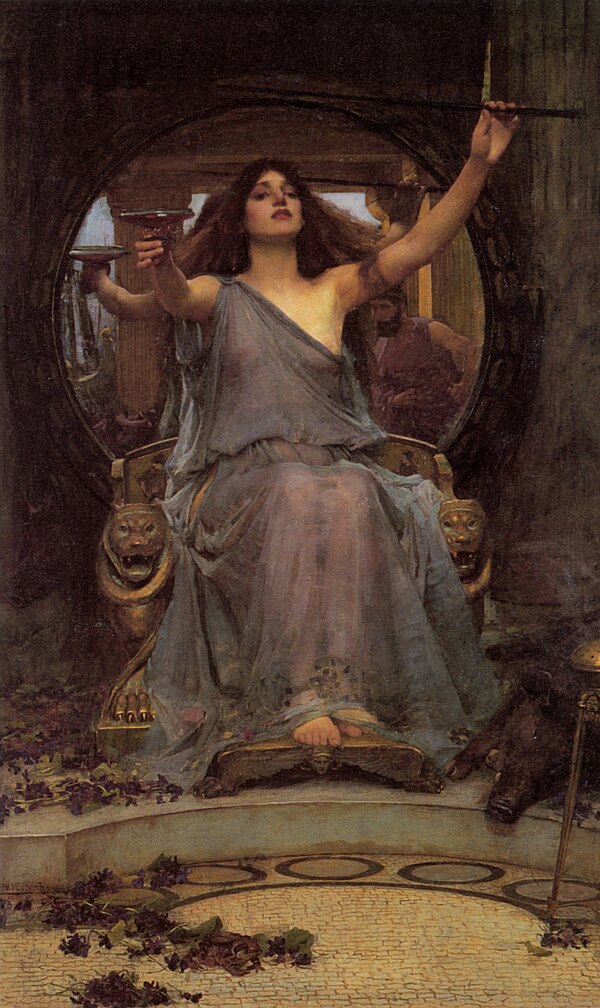
Waterhouse, Circe Offering the Cup to Ulysses (1891)
Aeneid 6 (cont.): glorious parade of future Romans
Aeneid 6.847-53 (Anchises explains the Romans' "civilizing" mission in the world)
"Others, I believe, will beat out bronze that seems
to breathe and chisel living faces out of marble.
They'll excel in pleading lawsuits, and they'll trace
the heavens' paths and chart the rising stars.
You, Roman, remember your own arts: to rule
the world with law, impose your ways on peace,
grant the conquered clemency, and crush the proud in war." [cf. end of Aeneid]
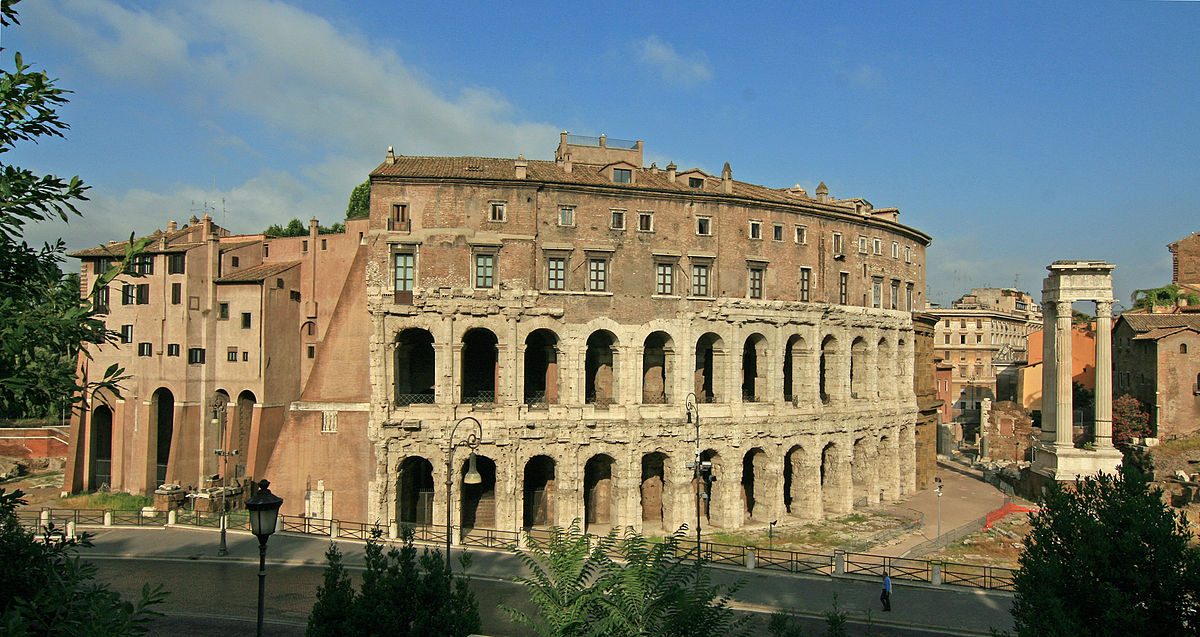
Remains of Theater of Marcellus in Rome (13 BCE)
- Marcellus: last in underworld parade, nephew & heir of Augustus (d. 23 BCE)
- exiting the underworld: gates of horn & ivory: cf. Penelope's dream of 20 geese & 1 eagle, Odyssey 19.562ff. (ivory gate for deceptive dreams, "their message is never accomplished . . . dreams that come into the open through the gates of the polished / horn accomplish the truth for any mortal who sees them")
Aeneid 6.893-8 (clash of Vergil's public/optimistic & private/skeptical voices?)
There are twin Gates of Sleep. One, they say, is made
of horn, and lets true visions pass through easily.
The other gleams with complex work in ivory,
but through it shades send lying visions to the light.
Anchises and the Sibyl brought Aeneas
to this gate and sent him through.
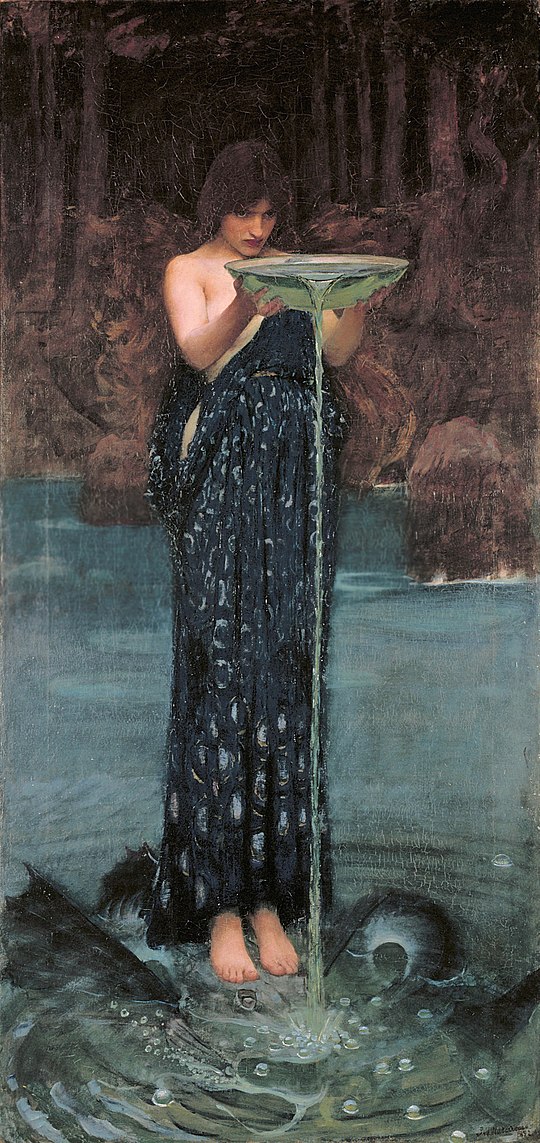
Waterhouse, Circe Invidiosa (1892)
Aenied 7: transition from Aeneas' Odyssey (Aeneid 1-6): "They grazed the shores of Circe", 7.10 (cf. Circe's Italian connections); mouth of Tiber River = promised land (cinematic)
- the Iliadic Aeneid (7-12)
Aeneid 7.37-45 (Iliad re-boot)
Come, Erato! I'll unfold the kings, the times, [Muse of love poetry]
the state of ancient Latium when foreign troops
first landed on Italian shores; I'll call
to memory the incidents that started war.
Goddess, guide your poet. I'll tell of brutal clashes,
battle lines, courage that sent kings to death,
Etruscan warriors, and all of Italy
in arms. A greater series of events begins,
a greater task for me.
- Trojans "eat their tables" (7.107ff.); "this comment / marked the end of hardship"); Anchises' prophecy? (Celaeno, 3.255ff.)
- King Latinus & Latins: palace, history, senate in Latium; Lavinia?
Aeneid 7.96-101 (oracle of Faunus, prophet & father of Latinus)
"Don't wed your daughter to the Latins, son,
don't trust the marriage that's already planned.
Foreigners will come to be your sons-in-law.
They'll raise our name up to the stars by blood.
Their sons will see the world under their feet.
They'll rule as far as both the seas seen by the circling
sun."
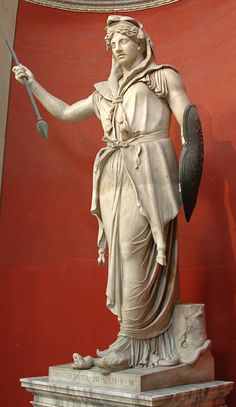
Juno Sospita (2nd century CE)
- Juno's intevention (Trojan War redux): Allecto to sow discord ("You cause loving brothers to seize swords, you wreck / families with feuds", 7.335-6) > Amata, Turnus (Trojan invaders)
Aeneid 7.313-16 (Juno's malicious plan)
"Granted: I can't keep him from his Latin kingdom,
I can't change Lavinia's destined marriage.
But I can delay
crucial events! I can
destroy their nations!"
- immediate cause of war (Allecto): stag of Silvia shot by Ascanius ("He fled wounded to the safety of his home / and made it to the stall, moaning, bloody, / filling the house with cries as if begging for help . . .", 7.500ff.), Silvia's brother Almo first killed; war erupts in idyllic Italy
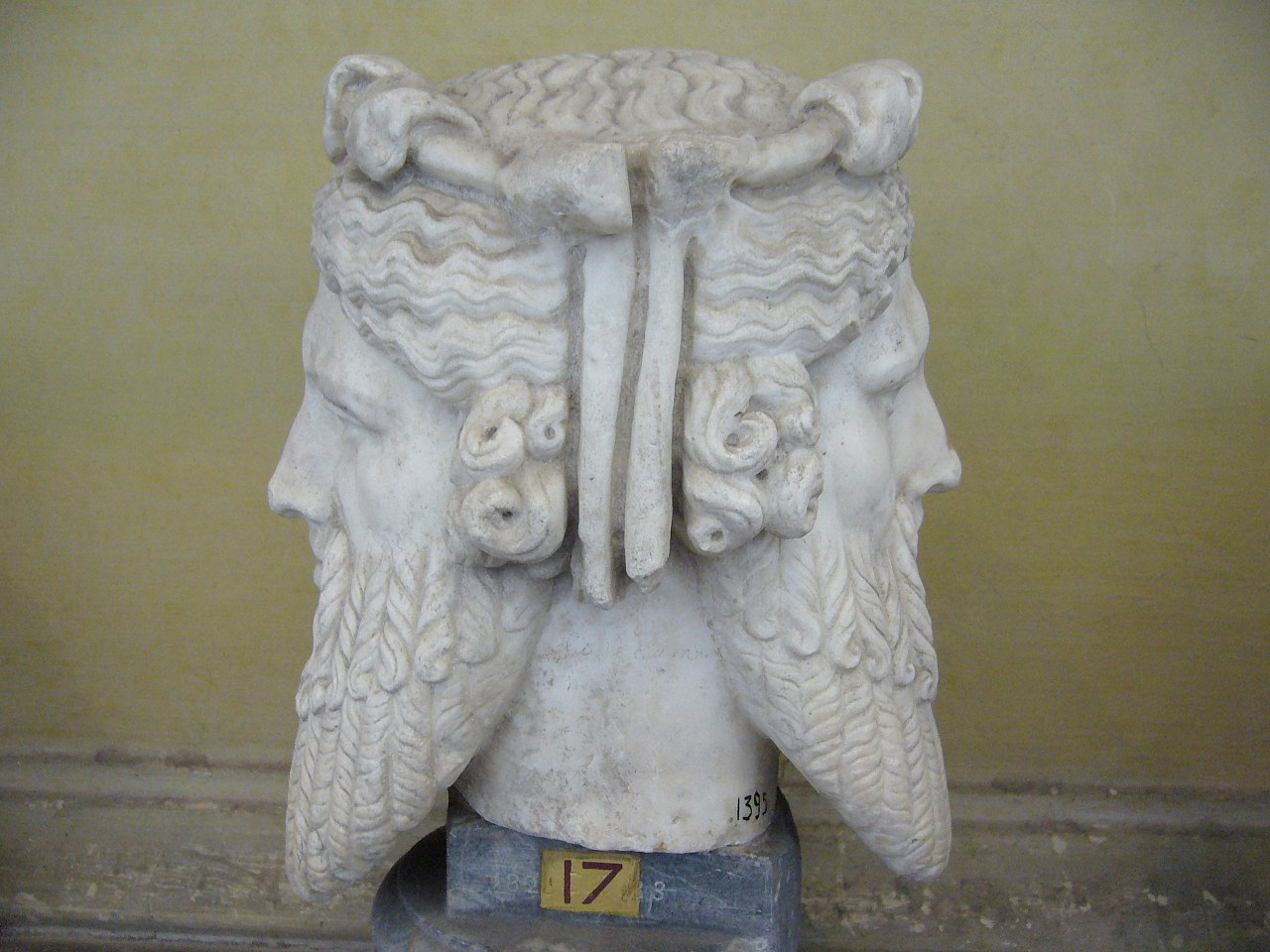
- Latinus unable to stop war: gate of Janus' Latin temple opened by Juno (7.601ff.)
- epic catalogue of Italian warriors (Muses), 7.641ff.: names, stories (sons of gods), lives, personal histories of indigenous peoples (cf. Vergil's Italian origins & escape from Octavian's land confiscations)
Aeneid 7.750-60 (narrator forecasts the death of the Marsian priest Umbro)
Next,
priest Umbro of the Marruviï,
bravest of men, sent by King Archippus,
his helmet decked with fronds of fertile olive.
He has the skill to sprinkle sleep on venom-breathing
snakes and vipers by his spells and touch.
With his art, he charms their anger, heals their bites.
But he can't cure a wound from Trojan iron;
his mesmerizing chants, the herbs he picked
on Marsian hills, will not help his wounds.
Umbro, how Angitia's forests and Fucinus'
glassy waters and clear lakes will weep for you.
- first warrior in catalogue: Mezentius (Aeneid 11), exiled Etruscan leader (son Lausus); last warrior: Camilla (Aeneid 11), leader of Volscians
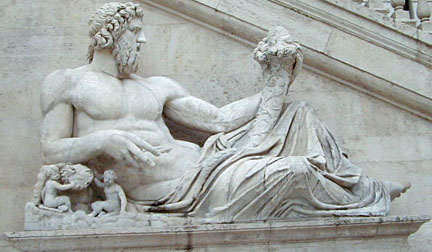
Tiberinus, 2nd century CE (Capitoline Museum, Rome)
Aeneid 8: R. Tiber (Tiberinus) appears to Aeneas in dream (8.31ff.), repeats prophecy of Helenus (white sow & piglets > Alba, founded by Ascanius), urges alliance with Evander at Pallanteum (where?)
- Evander (Greek immigrant) with Trojan connections; tour of future site of Rome ("Rome's strength has since raised these to the heavens, / but at that time Evander's state was poor indeed", 8.99-100); Pallas entrusted to Aeneas
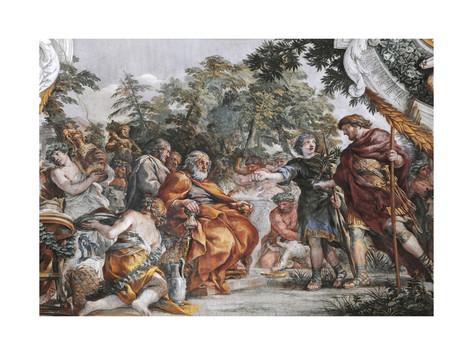
Pietro da Cortona Evander, Pallas and Aeneas (17th century)
- historicized shield of Aeneas forged by Vulcan, husband of Venus (historical threats to Roman security: "Roman triumphs, all the generations of / Ascanius's line, and their wars in sequence", 8.628-9); cf. Achilles' shield (Iliad 18)
- "the big lie" in middle of shield: civil war of Augustus vs. Antony misrepresented as quasi-cosmic, cultural battle of West ("Western Civilization") vs. East ("The Other"; "Orientalism"); cf. catalogue of Italians (end of Aeneid 7)
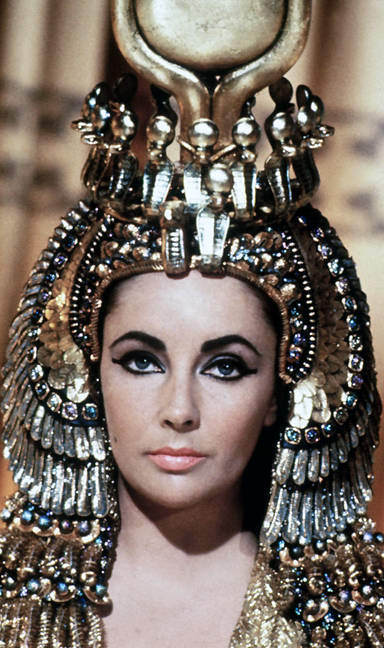
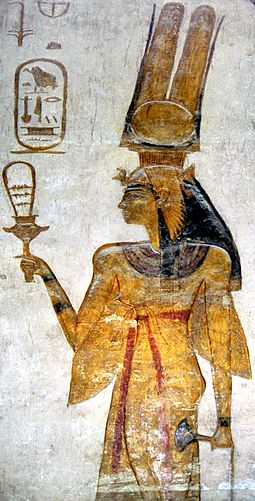
R: Nefertari, wife of
Ramesses II, holding a sistrum (13th century BCE)
Aeneid 8.675-706 (Battle of Actium on Aeneas' shield)
In the center sailed bronze warships: they fought
the sea battle of Actium. Cape Leucas, its waves
bright with gold, frothed with the armada.
Here Augustus Casear led all Italy
to war: the Senate, people, gods of sky and hearth. [Roman West]
From high on the stern, his bright brow poured
twin flames; his father's comet rose above.
Tall Agrippa steered the fleet, with gods and winds [Octavian's/Augustus' general]
behind him. He wore a naval crown; on it gleamed
bright images of prows, a martial honor.
Antony was opposite, with Asian wealth [Egyptian (et al.) East]
and hodgepodge troops, victor over Eastern hordes
and the Red Sea. He brought Egypt, Eastern might
distant Bactra—and (for shame!) a wife from Egypt. [Bactra: modern Afghanistan]
The forces smashed together and the whole sea frothed,
torn by oars and three-spiked beaks of boats.
The crews made for the open. Massive ships
rammed towering
sterns—you'd think the Cyclades, torn up, were free [Aegean islands around Delos: Aeneid 3]
to roam the waters, or that mountains smashed together.
Flaming flax and flying spears rained from their hands,
and just-spilled blood turned Neptune's fields red.
In the thick of it, the queen called to her fleet
with her native rattle—not seeing the pair of snakes
behind her. Monstrous mongrel gods and barking
Anubis turned weapons against Venus, Neptune,
and Minerva. Iron Mars was in their midst, mad
for battle. Awful Furies swooped in from the sky,
and Discord in her tattered cloak joined gladly.
Bellona followed with her bloody whip. [Roman war goddess]
Apollo saw this from his shrine, and aimed his bow.
At that, every Indian and Egyptian,
every Arab and Sabaean, cut and ran.
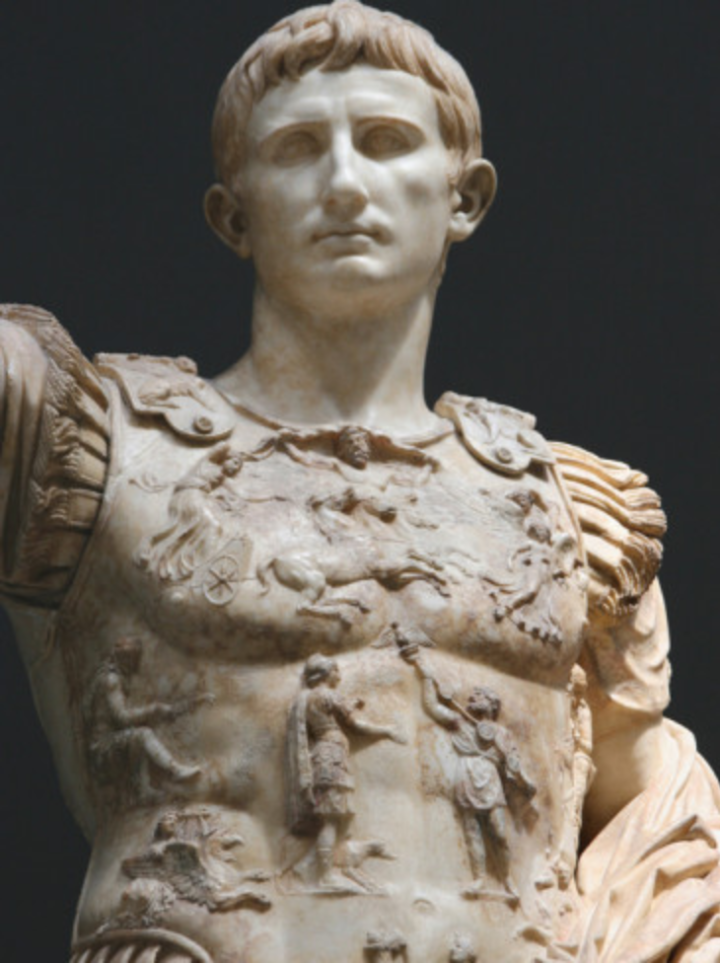
- Augustus' triumphal celebration (29 BCE) at very center of shield (8.714ff.); Augustan teleology ("goal/purpose of history"; cf. Achilles' shield)
Aeneid 8.729-32
Aeneas admires Vulcan's shield, his mother's gift,
pleased by images he does not understand.
He hoists the fame and fate of his descendants.









